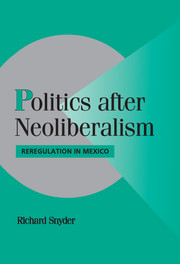Book contents
- Frontmatter
- Contents
- List of Illustrations
- Acknowledgments
- Acronyms
- Part I The Framework and Comparative Analysis
- Part II The Cases
- 3 REMAKING CORPORATISM FROM BELOW: A PARTICIPATORY POLICY FRAMEWORK IN OAXACA
- 4 WHEN CORPORATISM AND DEMOCRACY COLLIDE: AN EXCLUSIONARY POLICY FRAMEWORK IN GUERRERO
- 5 PEASANTS AGAINST OLIGARCHS: STALEMATE AND TRANSITION TO A PARTICIPATORY POLICY FRAMEWORK IN CHIAPAS
- 6 OLIGARCHS AS THE DOMINANT FORCE: AN EXCLUSIONARY POLICY FRAMEWORK IN PUEBLA
- Part III Conclusion
- References
- Index
5 - PEASANTS AGAINST OLIGARCHS: STALEMATE AND TRANSITION TO A PARTICIPATORY POLICY FRAMEWORK IN CHIAPAS
Published online by Cambridge University Press: 03 December 2009
- Frontmatter
- Contents
- List of Illustrations
- Acknowledgments
- Acronyms
- Part I The Framework and Comparative Analysis
- Part II The Cases
- 3 REMAKING CORPORATISM FROM BELOW: A PARTICIPATORY POLICY FRAMEWORK IN OAXACA
- 4 WHEN CORPORATISM AND DEMOCRACY COLLIDE: AN EXCLUSIONARY POLICY FRAMEWORK IN GUERRERO
- 5 PEASANTS AGAINST OLIGARCHS: STALEMATE AND TRANSITION TO A PARTICIPATORY POLICY FRAMEWORK IN CHIAPAS
- 6 OLIGARCHS AS THE DOMINANT FORCE: AN EXCLUSIONARY POLICY FRAMEWORK IN PUEBLA
- Part III Conclusion
- References
- Index
Summary
The politics of reregulation in Chiapas was foreshadowed by a curious incident in Texas. At the end of 1987, a District Court in Harris County rendered a $15 million verdict in favor of Quaestor Investments, Inc. Quaestor, an import–export firm based in the United States, had sued several close advisors to the governor of Chiapas. The firm sought compensation for the millions of dollars to buy coffee that it had advanced to a state government regulatory agency, the State Coffee Commission of Chiapas. Although thousands of small coffee farmers had delivered their crops to the State Coffee Commission, Quaestor received only a tiny fraction of the half-million bags it had purchased. Furthermore, most of the farmers had not been paid for their coffee. Quaestor's multimillion dollar investment had mysteriously disappeared, presumably into the hands of the governor's cronies who ran the Coffee Commission.
Quaestor Investments' unfortunate experience is more than just another example of the perils of doing business in so-called emerging markets. This case also highlights a crucial reason why the implementation of neoliberal reforms does not necessarily result in competitive markets: Subnational elites have strong incentives to reregulate local markets to their advantage. The Coffee Commission, established in 1985, four years before the withdrawal of INMECAFE, shows how even in the face of an extensive, national regulatory regime, subnational elites can nevertheless seek independent sources of rents by launching their own regulatory initiatives. Neoliberal reforms at the national level can intensify the regulatory impulses of subnational actors.
- Type
- Chapter
- Information
- Politics after NeoliberalismReregulation in Mexico, pp. 134 - 163Publisher: Cambridge University PressPrint publication year: 2001



